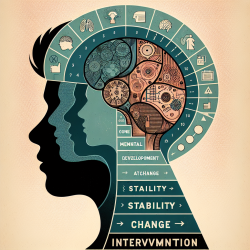Introduction
Adolescence is a critical period of transformation, marked by significant social, cognitive, and physiological changes. This stage of life presents both challenges and opportunities for mental health development. The CogBIAS Longitudinal Study of Adolescence provides valuable insights into the psychological development during this period, highlighting the stability and change in various psychological measures across three waves of data collection.
Understanding the CogBIAS Longitudinal Study
The CogBIAS Longitudinal Study tracked a cohort of 504 adolescents in the UK, assessing them at ages 13, 14.5, and 16. The study aimed to understand the psychological variables that contribute to emotional vulnerability and resilience. By examining self-report mood measures, other self-report measures, and behavioral measures, the study provides a comprehensive view of adolescent development.
Key Findings and Implications
- Measurement Reliability: The study found good reliability for self-report measures, while behavioral measures showed lower reliability. This highlights the importance of using robust tools for assessing psychological traits.
- Stability of Individual Differences: The study observed substantial stability in individual differences, particularly in self-report measures. This suggests that psychological characteristics become stable during early adolescence, presenting a critical window for intervention.
- Adolescent-Typical Changes: The study identified normative changes, such as worsening mood, increasing impulsivity, and improvements in executive functions. These changes underscore the dynamic nature of adolescence and the need for targeted interventions.
Practical Applications for Practitioners
For practitioners working with adolescents, the findings from the CogBIAS study offer valuable guidance:
- Early Intervention: The stability of psychological traits during adolescence suggests that early intervention can be effective in promoting positive mental health outcomes.
- Focus on Mood and Impulsivity: Interventions targeting mood disorders and impulsivity-related behaviors can help mitigate the risks associated with these changes during adolescence.
- Enhancing Executive Functions: Programs that support the development of executive functions can aid adolescents in navigating the challenges of this developmental stage.
Encouraging Further Research
While the CogBIAS study provides a robust foundation, further research is needed to explore the complex interplay of psychological variables during adolescence. Longitudinal studies with diverse populations can help identify universal and culture-specific factors influencing adolescent development.
To read the original research paper, please follow this link: The CogBIAS longitudinal study of adolescence: cohort profile and stability and change in measures across three waves.










